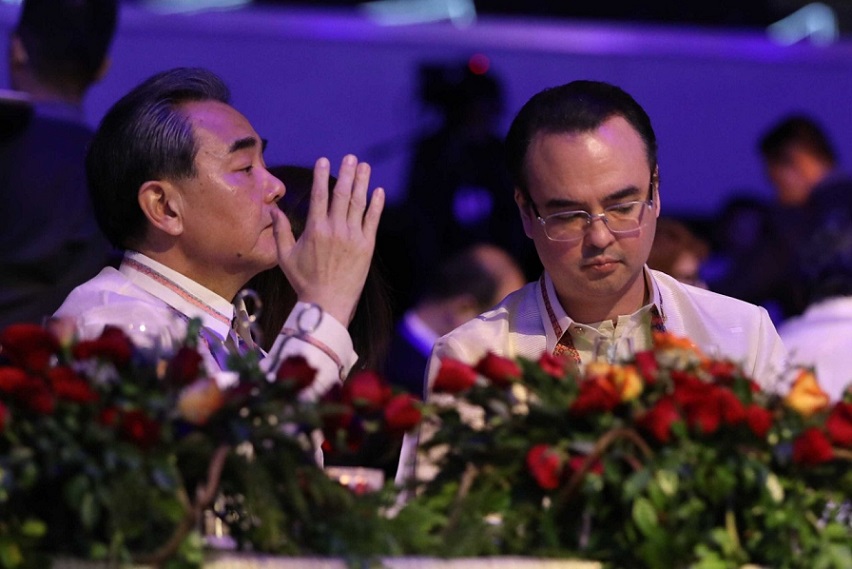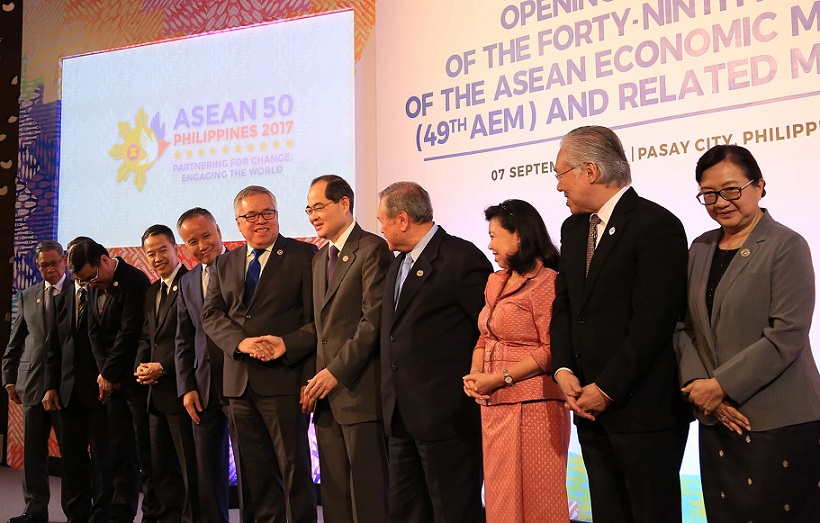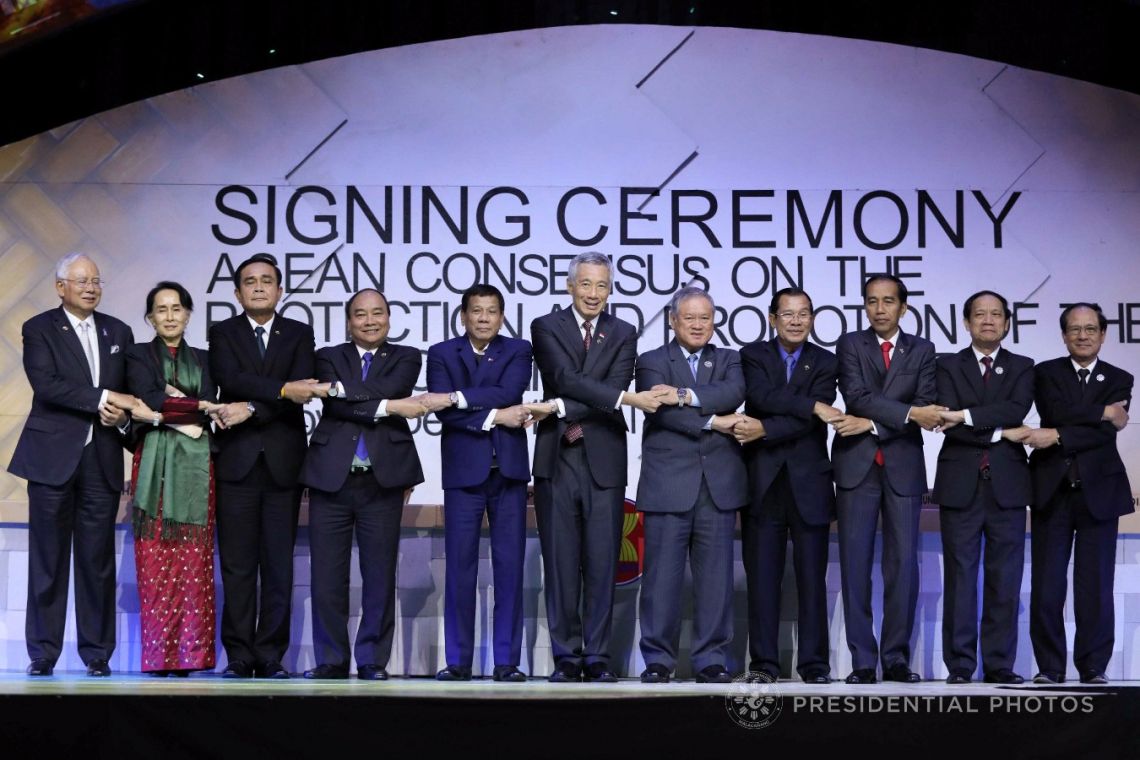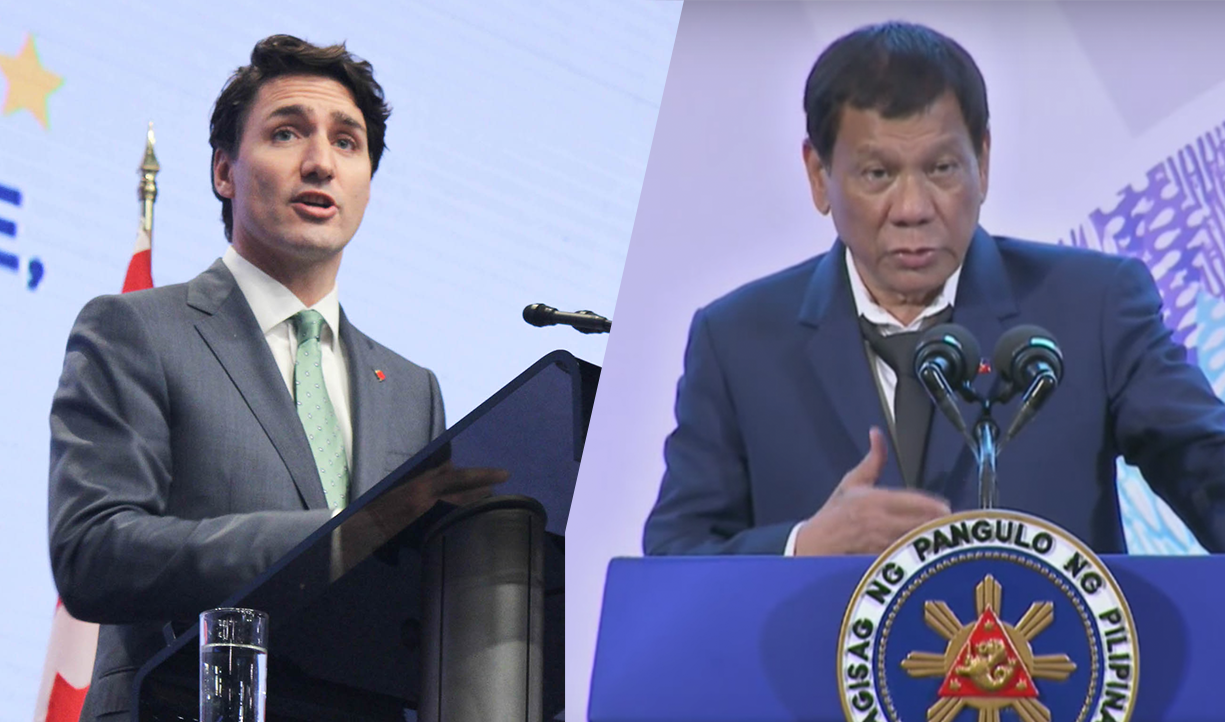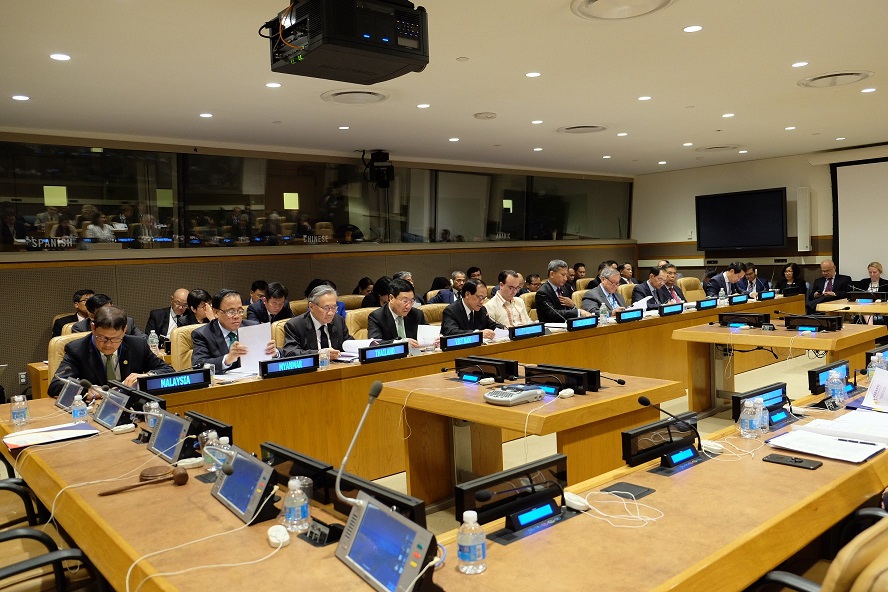
Foreign Secretary Alan Peter Cayetano at the meeting of ASEAN leaders oin the sidelines of the United Nations General Assembly. Photo from asean.org.
The Philippines’ chairing of the Association of Southeast Asian Nations (ASEAN) on the regional organization’s 50th anniversary received a rude shock when Malaysia dissociated itself from a statement on the humanitarian crisis in Myanmar, issued by Philippine Foreign Secretary Alan Peter Cayetano.
Released at the sidelines of the United Nations General Assembly in New York on Sep 25, Cayetano’s statement was a bland expression of “concern over the recent developments in Northern Rakhine State of Myanmar”, following government security operations in which hundreds of Rohingya Muslims have been killed and some 450,000 have fled to Bangladesh.
Malaysian Foreign Minister Malaysian Anifah Aman blasted the Cayetano statement as a “misrepresentation of reality” that failed to convey the large-scale repression unleashed by Yangon and did not even explicitly mention the Rohingya community.
Breaking with the Consensus Rule
Malaysia’s strong dissent was a rare departure from ASEAN’s so-called consensus rule, whereby public declarations issued in the name of the organization must enjoy the support of all member states or not issued at all.
Strong domestic pressure from the country’s Muslim majority caused the government of Prime Minister Najib Razak to break ranks, a move that was hailed by human rights activists who have long complained that the consensus rule has allowed governments engaged in repressive acts to be shielded from peer criticism.
Aggressive lobbying by the Myanmar government was probably the main factor behind Cayetano’s weak statement. But the foreign secretary was probably also motivated by a desire to shield his own government from strong peer criticism in the future should the thousands of extra-judicial killings in President Rodrigo Duterte’s “war on drugs” become a major issue in ASEAN.
Controversy over the De Lima Visit
Malaysia’s breaking the consensus rule is just one of a number of embarrassments that have hounded the Philippines as ASEAN chair.
Shortly before the ASEAN Inter-Parliamentary Assembly’s 38th session in Manila, two ASEAN parliamentarians, MPs Charles Santiago and Tian Chua of Malaysia, were barred from visiting imprisoned Senator Leila de Lima at the Philippine National Police headquarters on Sep. 19.No explanation was given by the PNP for its refusal to grant the legislators visiting rights despite their having complied with the requirement to file a request 10 days in advance.
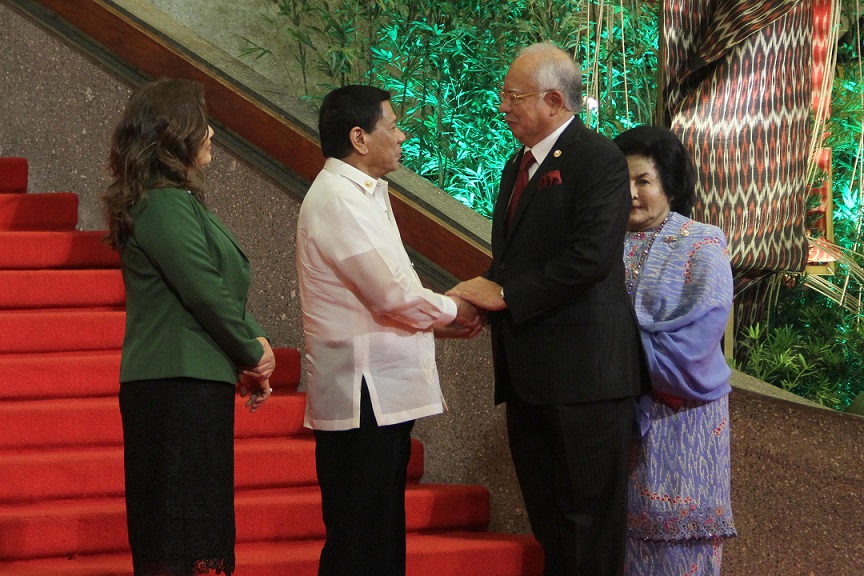
Pres. Duterte welcomes Malaysian Prime Minister Najib Razak Asean Summit April 2017. Photo by Asean50
“This again demonstrates the deeply concerning state of democracy in the ASEAN region. Even in the Philippines — previously one of the most open societies in Southeast Asia — the government’s authoritarian restrictions betray a deep fear of legitimate public scrutiny,” said Santiago, chairman of the ASEAN Parliamentarians for Human Rights. There has been no response from the Philippine government.
U-Turn on the South China Sea
There is a deeper malaise that affects ASEAN with the Philippines as its chairman.ASEAN members still have to wrap their heads around the transmogrification of the Philippines from being one of the strongest defenders of national territorial rights in the South China Sea to being a competitor with Cambodia in complying with China’s wishes.
The joint communique of the 50th ASEAN Foreign Ministers’ Meeting, issued on Aug. 5, has been criticized as weak. ASEAN ministers agreed only on the outline for negotiations of a Code of Conduct, refraining from criticizing China directly for its military build-up in the area.
Foreign Secretary Cayetano’s defense of the document has inadvertently strengthened the impression that the Philippines has become too solicitous of China’s interests.He said that the “political objective” of some critics “is to shame China.” ASEAN’s retreat from challenging China is, nevertheless, real.
Mixed Record on Social Issues
In areas of concern to civil society, the record of the Philippines’ chairmanship is mixed.
Migrants’ rights is one of the most controversial issues in ASEAN, with its divide between labor-sending countries like the Philippines, Cambodia, Indonesia, and Myanmar, and labor-receiving countries like Malaysia and Singapore.
ASEAN issued a declaration on the protection of promotion of migrant rights in 2007, but a decade later, the draft instrument for achieving these rights remains tightly guarded by the governments.So far, under the Philippine watch, there has been no move on the part of the chair to disclose the document.
However, Ellene Sana, executive director of the Center for Migrant Advocacy in the Philippines, said the Philippines’ chairmanship is “generally satisfactory because the Philippine representative sitting in the drafting committee of the ASEAN instrument tries as much as possible, given the ‘oath of silence’ among the governments, to be consultative and transparent with civil society organizations (CSOs).”
A major area of engagement for CSOs is social protection.Since 2013, organizations such as the Network for Transformative Social Protection have brought their proposals to the ASEAN secretariat as well as to the different governments.They expected to have a strong input into the official ASEAN High-Level Conference on Social Protection held in mid-August in Manila.
CSO participation at the conference was, however, very limited, much of it consisting of organizations making their position papers available to ASEAN officials.Disappointed, Maris de la Cruz, a leading social protection activist, said the Philippines as chair “could have pushed for institutionalizing CSO participation in ASEAN discussions on social protection.”Moreover, it could have promoted the notion that “social protection is not only for the poorest of the poor, but that it is for all, especially in these times when precarity in livelihoods and climate change have made almost everyone vulnerable.”
Social protection seems destined to go the way of migrant rights and human rights: adopted in rhetoric, filed away in terms of being given substance.
Duterte’s Legacy
The Philippine chairmanship of ASEAN in 2017 may well be remembered for two things.One was Malaysia’s breaking with the consensus over a statement that was weak on human rights, drafted by the Philippines as ASEAN chair.The second was the chair’s failing to stand up for the rights of ASEAN member states in the South China Sea and giving China “a free pass.”
These two developments are linked by a third, the significance of which may only emerge in the years to come.
Duterte’s U-turn on China is mainly interpreted in ASEAN as stemming from Duterte’s bristling at former US President Barack Obama’s criticism of extra-judicial killings and from a desire to feed at the trough of Beijing’s economic largesse.What is not often appreciated is that Duterte admires Beijing’s authoritarian system, which he sees as producing results that the Philippines unwieldy democratic system cannot deliver.
Duterte has already imposed martial law in Mindanao and is, in the view of many, just waiting for the perfect excuse to declare it nationwide.Should that happen, the balance of forces in ASEAN would be definitively tilted in favor of authoritarian regimes vis a vis democratic ones, with only Indonesia and Myanmar—questionably—remaining in the democratic camp.
If Duterte has his way, the Philippines’ chairing of ASEAN on the organization’s 50th anniversary could be the last time it would serve as chair as a democratic government.
(Walden Bello is the International Adjunct Professor in Sociology at the State University of New York at Binghamton and co-chairperson of the Board of the Bangkok-based Focus on the Global South. He contributed this article to the Reporting ASEAN series.)

